Release 5.3.0-Ultimate for Onesait Platform
Last Friday, January 12, we launched version 5.3.0 of Onesait Platform, which we have named «Ultimate», thanks to the invaluable help of our Community, and following our established versioning policy.
With this release, we have completed the work on our 2023 roadmap, so we are now getting down to work on the tasks for the year 2024, which is off to a strong start.
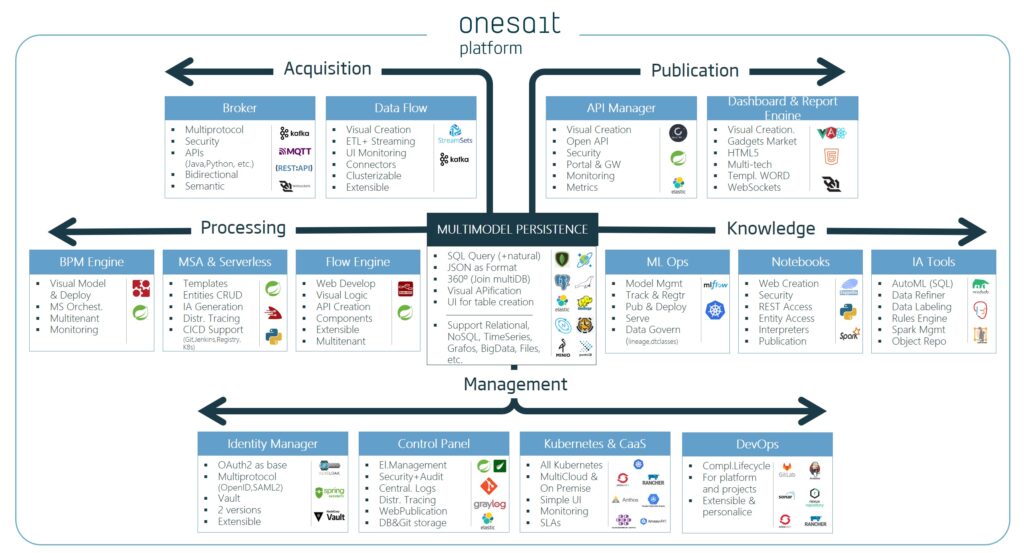
And what does this version 5.3.0-Ultimate includes? Let’s take a look at what’s new.
New Features
Managing Kubernetes PODs from Control Panel
This functionality allows users with an “Administrator” role to manage the PODs deployed in the Kubernetes Platform cluster.
That is, these users will be able to start, stop and scale the Platform services (and microservices in the same namespace) from the Control Panel itself.
The following image shows the user interface associated with the Environment Management, which will allow access to the list of all Platform services deployed in the configured namespace, from where they can be started, stopped, scaled or updated.
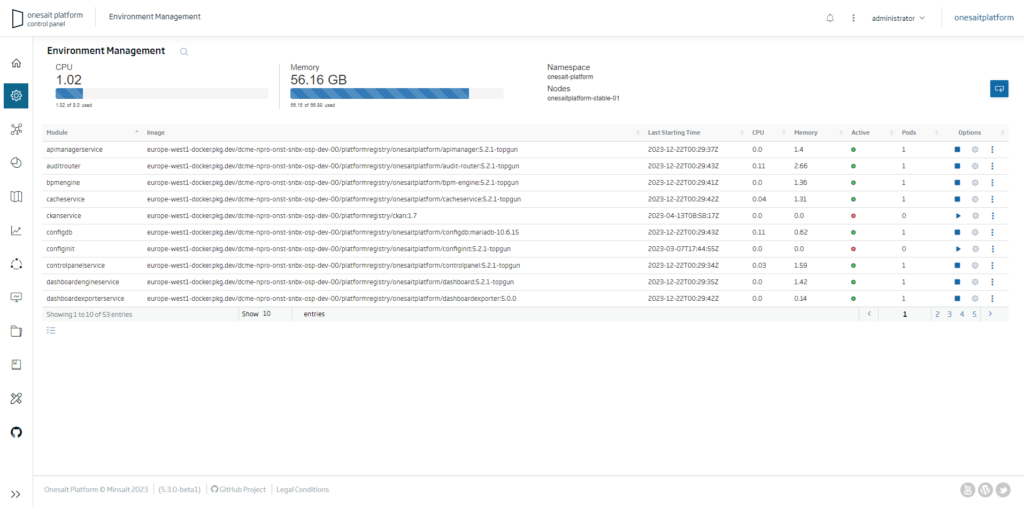
In addition, we will be able to access the configuration of each POD:

If you are interested in learning more about this new feature, be sure to visit this guide (in Spanish) we have prepared on our website.
New functionalities in OP Forms
During these months we have continued working on the Platform Forms (OP Forms), incorporating the resolution of incidents, improvements and new functionalities. The main ones are:
- Forms integrated with the Platform’s web templates.
- Complete overhaul of ODS-compliant form and component styling.
- Incorporation of new components, such as paged table, Nester Form, email and DateTime components.

We have prepared an article (in Spanish) with all the new features we have incorporated.
Gravitee 3.X as API Platform Manager
Onesait Platform uses Gravitee as an advanced API Manager when advanced API management functionalities are needed. Until now we were using Gravitee version 1.X.
In this release the Platform API Manager is based on Gravitee 3.X which incorporates new features such as:
- Publication of APIs as protocol mediation to MQTT, Kafka, gRPC, etc.
- New Management UI.
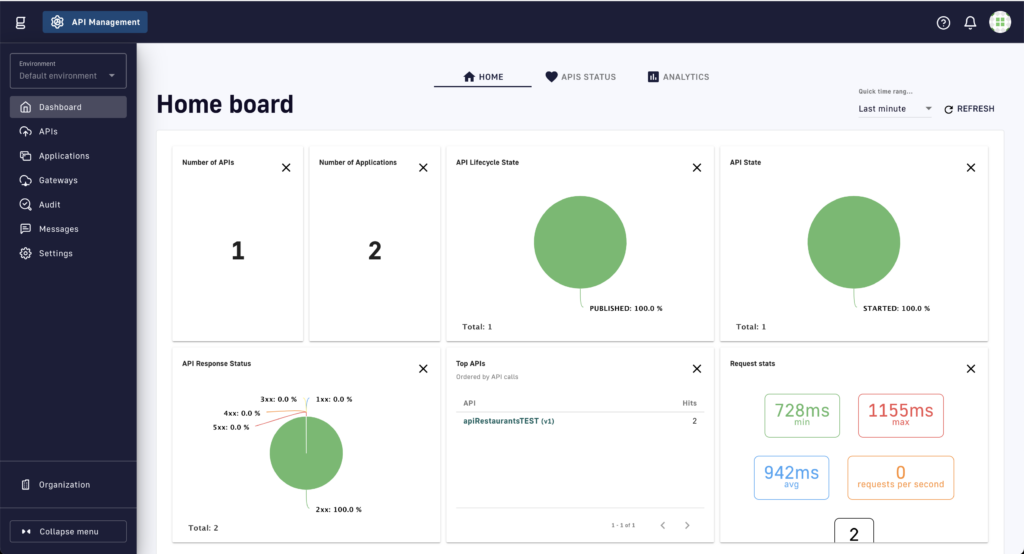
- Policy Studio.
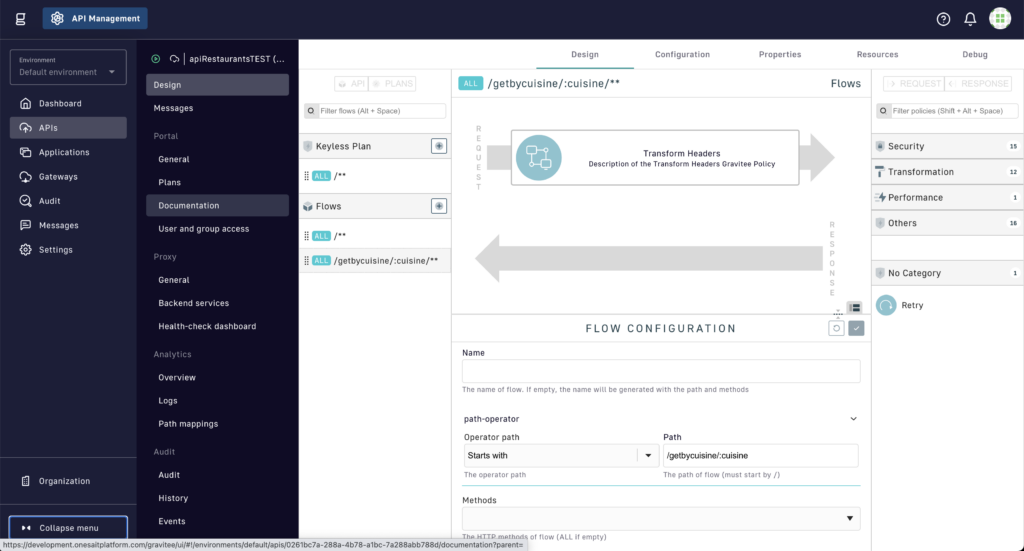
- Debug of requests.
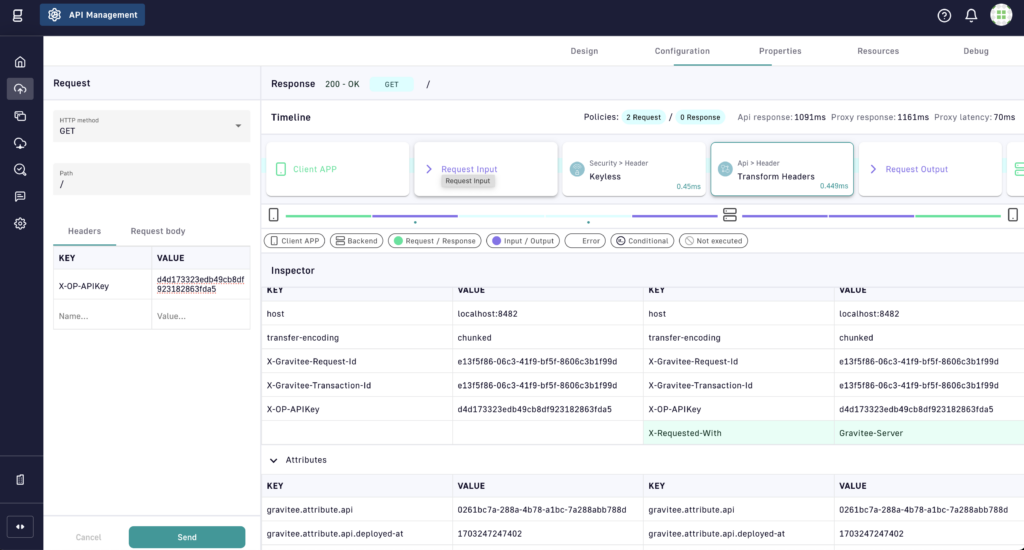
- New API Portal
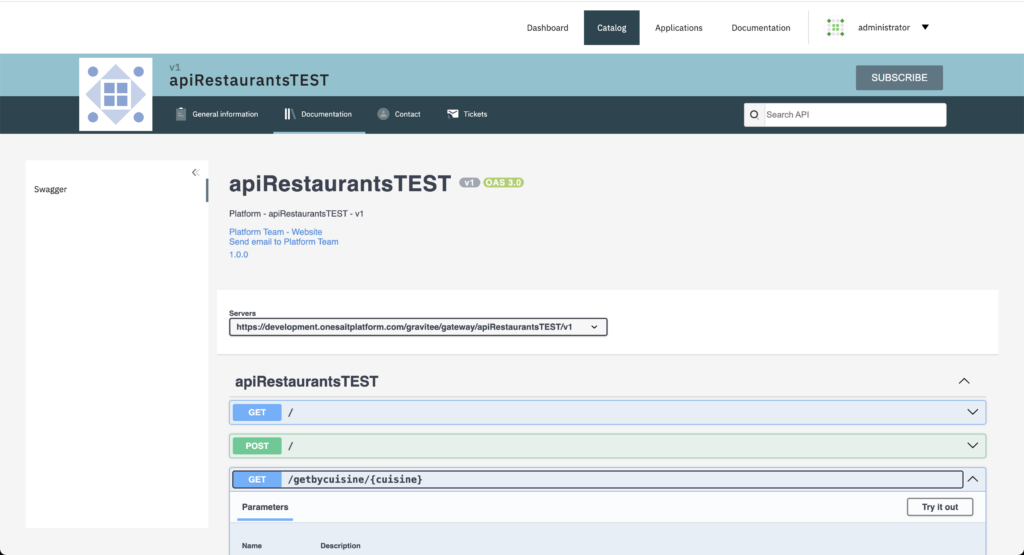
We have more information about it in this post (in Spanish) we have created in our website.
Monitoring in Notebooks Engine
This functionality will allow us to monitor the individual and overall consumption of the Notebooks and to have control over them in the Platform (Notebook user interface). In this way, we will be able to know the status of each Notebook, see the running processes, control the status, etc.
To this end, we have created two new metrics:
- Resource metrics: At the interpreter level, the processes, type of interpreter (shared, scoped or isolated), if it is associated to a notebook and the CPU and RAM consumption.
- Execution metrics: They give the execution detail of the paragraphs that the user sees, Notebook, paragraph, interpreter, etc. This monitoring will act as an execution history.
If you are interested in knowing in detail about the new Monitoring, you can find more information in this article (in Spanish) we have prepared.
EXPAND Functionality on Relational Entities
When working with relational databases, Platform Entities/Ontologies are mapped to tables, and tables are related to each other (in 1-1, 1-N and N-N relationships).
The Platform allows to relate the Entities, and the EXPAND functionality allows that when making a query, insertion or update, the Platform automatically knows how to work with the Entities related to the parent Entity and returns the data of these.

In this entry (in Spanish) of our website you can access a complete example of the use of the functionality.
Improvements and new Assets
In addition to the new features mentioned above, version by version we incorporate to the Platform improvements in existing parts, new assets, and of course the resolution of all the incidents detected during the quarter.
Among these improvements we would like to highlight the following.
New Application View in the initial screen of the Control Panel
With the new initial Application View, a user will be able to see on his home screen all the Applications created or in which that user participates.
In addition, the user can select which of the two views is more appropriate by means of a selector in the view itself.

We expand on this improvement in this article (in Spanish) on our website.
Process verifier asset
The new process verifier asset will allow us to check the result of the execution of processes developed on the Platform allowing us to verify the correct loading of data into the Platform.
In addition to this, the process verifier allows us to add rules to these processes for a better control of the inserted data, such as a rule that checks the correct integrity of the loaded data (dataExist) or one that allows us to control the number of loaded records (volumetry).

En esta entrada de nuestra web podéis acceder al código del Verificador así como a la descripción por completo el proceso.
In this entry (in Spanish) of our website you can access the code of the Verifier as well as the complete description of the process.
Jupyter Plugin to export Notebooks to the Platform
Jupyter Plugin to export Notebooks to the Platform
Hemos creado un plugin para JupyterLab 4.x que nos va a permitir exportar un o varios Notebooks Jupyter a Onesait Platform de manera rápida y sencilla.
We have created a plugin for JupyterLab 4.x that will allow us to export one or more Jupyter Notebooks to Onesait Platform quickly and easily.

We explain how to install and use it in detail in this tutorial (in Spanish) we have prepared on our website.
Integration of xWiki as a Platform Extension-Module
In this release we have integrated xWiki as an optional module in Onesait Platform for those who need to include a wiki in their projects and products.

XWiki is an open source platform with LGPC license that allows you to create and customize a wiki as needed. Using structured data and scripts in different languages (Velocity, Python, Groovy, etc.), it allows you to create macros and applications to extend the capabilities of the wiki, adjusting to the needs of each moment.
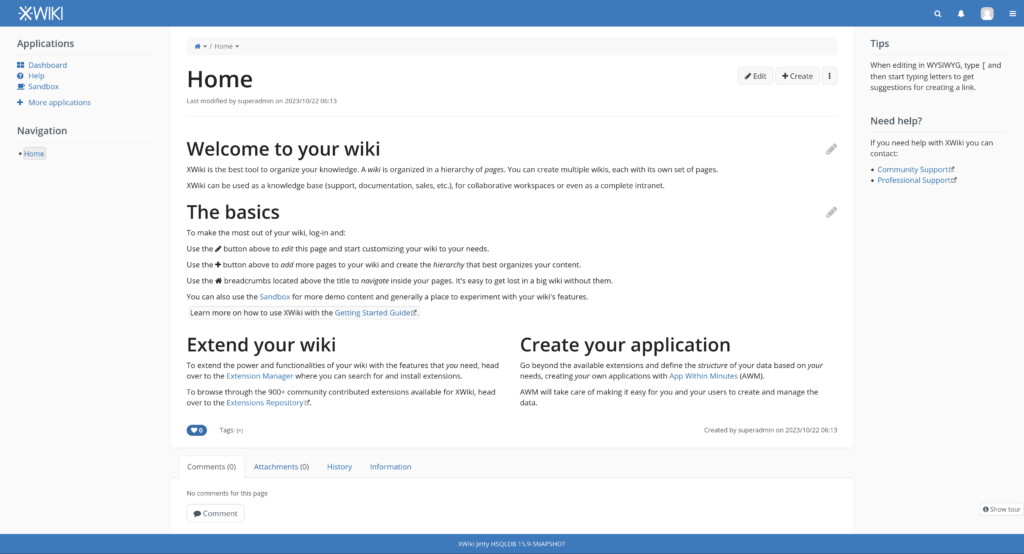
We explain it to you in this post (in Spanish) we have prepared on our website.
Sample web application asset using the web template with forms and Dashboards
We have created an active web application example built in Vue.js, which from the Platform web template creates a complete web application with authentication, permissions, configurable menus, Dashboards and forms.
In this tutorial (in Spanish) we have created you can see how to create the web application.
Usability improvements in Dashboards
We have also included several improvements in the use of Dashboards, which we explain in this post (in Spanish).
Community Versions
Release 5.2.0-ce published on GitHub
We have available version 5.2.0 Community Edition of the Platform in our GitHub repository, where you can download and test it for free.

Updated Onesait Platform Lab environment
We will soon be upgrading the Onesait Platform Lab, our experimentation environment, to version 5.2.1-TopGun.
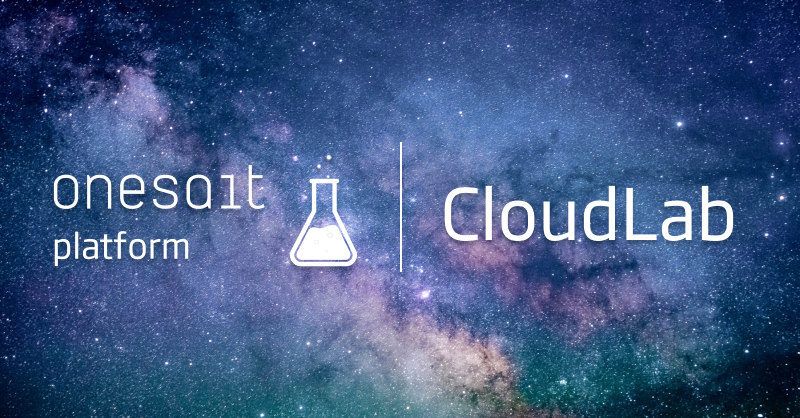
As you can see, we are starting the year strong with many new features.
We hope you find them interesting, and if you are interested in us explaining something in particular, or you want to see a live demonstration of how something works, do not hesitate to contact us at our support email: support@onesaitplatform.com

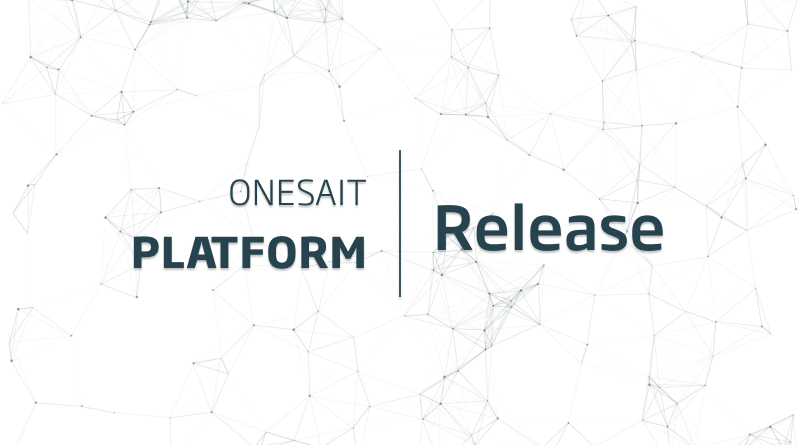
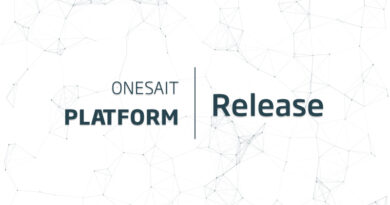

Pingback: Kubernetes POD management from Control Panel – Onesait Platform Community
Pingback: OF Forms Enhancements – Onesait Platform Community
Pingback: Gravitee 3.X as Onesait Platform API Manager – Onesait Platform Community
Pingback: Monitoring in Notebooks Engine – Onesait Platform Community
Pingback: New Process Verifier Asset – Onesait Platform Community